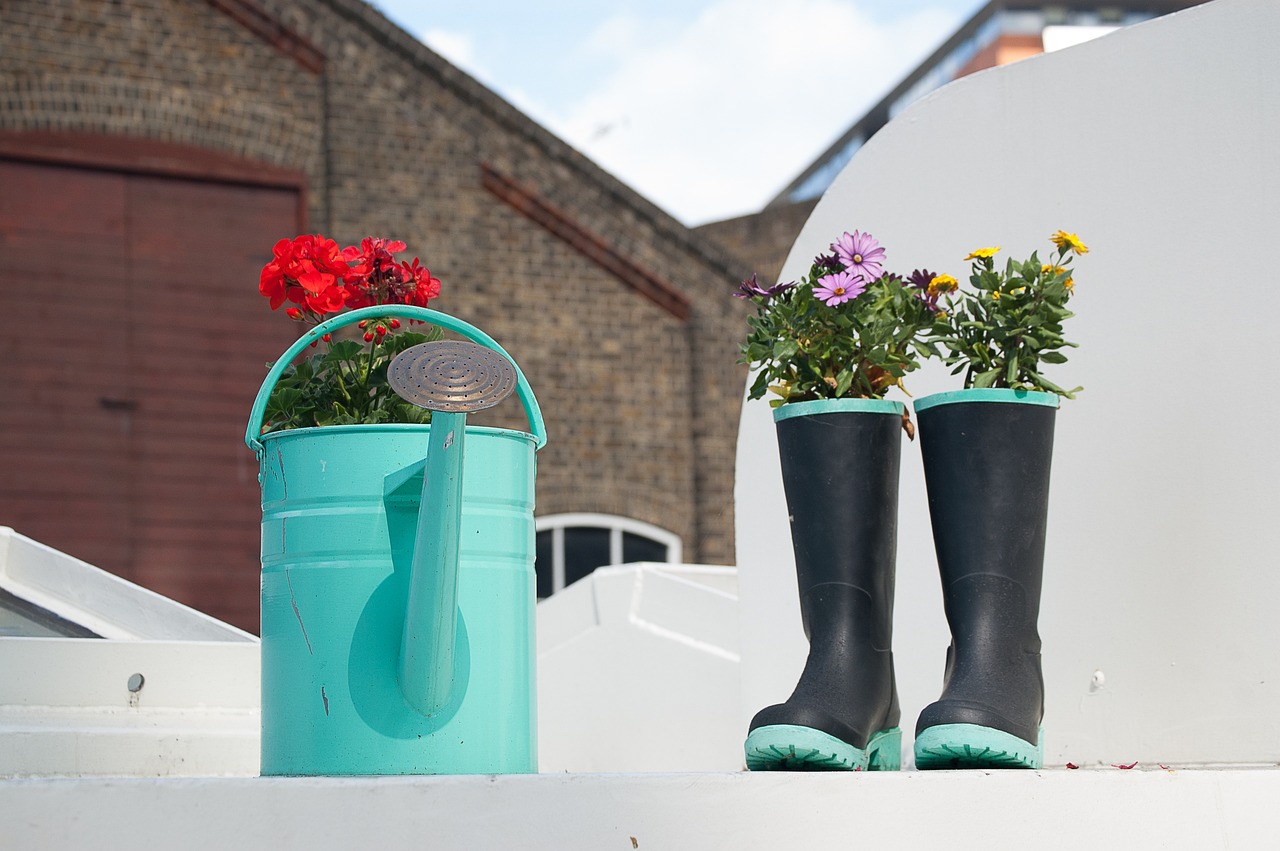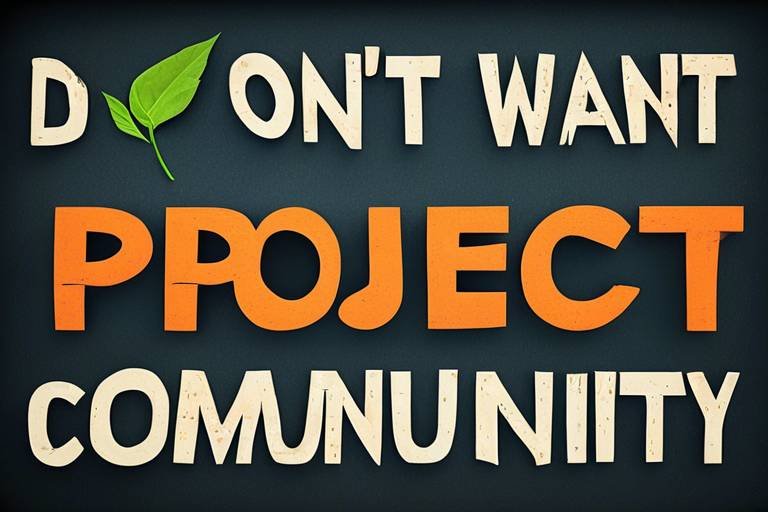How to Get Your Family Involved in Eco-Friendly Practices
Are you looking to embark on a journey towards a greener lifestyle with your loved ones? Engaging your family in eco-friendly practices can not only benefit the environment but also foster a sense of unity and responsibility within the household. By involving everyone in sustainable living initiatives, you can create a positive impact that ripples beyond the walls of your home.
One effective way to kickstart your eco-friendly journey as a family is through educational initiatives. Introduce environmental education programs and resources that enlighten family members about the significance of sustainable practices. By understanding the impact of their actions on the environment, your family can make more informed choices that contribute to a healthier planet.
Setting green goals together can be a fun and motivating way to instill a sense of purpose in your sustainability efforts. Collaboratively establish sustainability goals and develop a plan to achieve them as a family unit. Whether it's reducing water consumption, minimizing waste, or adopting energy-saving habits, working towards common objectives can strengthen family bonds while making a difference.
Implementing recycling systems at home is crucial for reducing waste and cultivating recycling habits among family members. Create designated recycling bins for different materials, educate everyone on what can be recycled, and make it a routine to sort and dispose of waste responsibly. By making recycling a seamless part of your daily life, you can significantly decrease your household's environmental footprint.
Encouraging energy conservation within the household is another impactful way to involve your family in eco-friendly practices. Emphasize simple habits like turning off lights when not in use, unplugging electronics, and opting for energy-efficient appliances. Not only will these actions lower your energy bills, but they will also contribute to a more sustainable future for generations to come.
Meal planning for sustainability is a creative way to introduce eco-conscious choices into your family's daily routine. Explore meal planning strategies that prioritize locally sourced, organic ingredients to reduce your carbon footprint. By supporting local farmers and choosing seasonal produce, you can enjoy nutritious meals while supporting sustainable food practices.
Engaging in gardening and composting projects can be both educational and rewarding for the whole family. Planting a garden together not only teaches valuable lessons about food production and biodiversity but also allows you to enjoy the fruits of your labor. Composting kitchen scraps and yard waste further reduces landfill waste and enriches the soil, closing the loop on organic waste management.
Community involvement plays a vital role in promoting eco-friendly practices beyond your household. Participate in local environmental initiatives, volunteer for green causes, and engage with the community to raise awareness about sustainability. By joining forces with like-minded individuals, you can amplify your impact and inspire others to embrace a greener lifestyle.
Celebrating eco-friendly milestones within the family is essential for maintaining motivation and reinforcing positive habits. Recognize and applaud achievements in sustainable practices, whether it's reducing plastic use, conserving water, or supporting eco-friendly businesses. By acknowledging progress and celebrating success, you create a supportive environment that encourages continuous efforts towards a more sustainable future.

Educational Initiatives
Exploring ways to engage your family in sustainable living practices and promoting environmental awareness within the household.
Introducing environmental education programs and resources to educate family members about the importance of eco-friendly practices. By incorporating into your family's routine, you can raise awareness about environmental issues and inspire sustainable actions. Utilize online resources, documentaries, and books to spark discussions and encourage learning about the impact of individual choices on the environment.

Setting Green Goals Together
Setting Green Goals Together involves creating a shared vision of sustainability within your family. By sitting down together and discussing the importance of eco-friendly practices, you can establish common goals that everyone can work towards. This process is not just about setting goals but also about fostering a sense of unity and purpose within the family unit. It's like embarking on a journey together towards a greener and more sustainable lifestyle.
One way to approach this is by creating a Green Goals Board where each family member can contribute their ideas and aspirations for a more environmentally conscious household. This visual representation can serve as a constant reminder of the collective commitment to sustainability. It's like a roadmap that guides your family towards a greener future.
Moreover, setting green goals can also involve allocating responsibilities to each family member based on their interests and strengths. For example, one member may take charge of reducing water consumption, while another focuses on implementing energy-saving practices. This division of tasks not only ensures that everyone is actively involved in the process but also instills a sense of accountability and ownership. It's like turning a shared vision into actionable steps that lead to tangible results.
Additionally, celebrating small victories along the way can be a great motivator for the entire family. Whether it's reaching a milestone in reducing waste or successfully growing your first batch of vegetables in the backyard, acknowledging these achievements reinforces the importance of collective efforts towards sustainability. It's like fueling the momentum to continue making positive changes for the environment.

Implementing Recycling Systems
Implementing Recycling Systems is a crucial step towards creating a more sustainable household. By setting up effective recycling systems at home, you can significantly reduce waste and encourage eco-friendly habits among family members. One way to start is by designating separate bins for different types of recyclables, such as paper, plastic, glass, and metal. This makes it easier for everyone to sort their waste correctly and ensures that recyclable materials are not mistakenly thrown away as trash.
Additionally, consider creating a composting system for organic waste like food scraps and yard trimmings. Composting not only reduces the amount of waste sent to landfills but also produces nutrient-rich soil that can be used in gardening projects. You can involve the whole family in the composting process, teaching them about the natural cycle of decomposition and the benefits of organic waste recycling.
Another important aspect of implementing recycling systems is to educate family members about the importance of recycling and the impact of waste on the environment. You can organize educational activities or discussions to raise awareness about the benefits of recycling and the consequences of improper waste disposal. By involving everyone in the conversation, you can foster a sense of responsibility towards the environment and encourage active participation in recycling efforts.

Encouraging Energy Conservation
Encouraging energy conservation within your household is not just about saving money on utility bills; it's also about making a positive impact on the environment. By instilling energy-saving habits in your family members, you can collectively reduce your carbon footprint and contribute to a more sustainable future. One effective way to promote energy conservation is by setting a good example for your family. Show them the importance of turning off lights when leaving a room, unplugging devices when not in use, and using energy-efficient appliances.
Additionally, you can educate your family about the benefits of energy conservation. Explain how reducing energy consumption helps lower greenhouse gas emissions and preserves natural resources. Encourage discussions about the environmental impact of energy use and brainstorm together on ways to be more energy-efficient in your daily routines.
Creating a family energy-saving plan can also be a fun and engaging way to involve everyone in the process. Sit down together and establish specific goals, such as reducing overall energy consumption by a certain percentage each month. Track your progress as a family and celebrate achievements along the way to stay motivated.
Another effective strategy is to implement energy-saving practices in your household. Consider installing programmable thermostats, using natural lighting whenever possible, and encouraging shorter showers to save water heating energy. By making small changes in your daily habits, you can make a big difference in reducing your energy usage.
Furthermore, rewarding energy-saving efforts within your family can help reinforce positive behaviors. Consider creating a reward system where family members earn points or tokens for practicing energy conservation. These rewards can be redeemed for fun activities or treats, creating a sense of excitement and motivation to continue saving energy.

Meal Planning for Sustainability
Meal planning plays a crucial role in promoting sustainability within your family. By consciously selecting ingredients and planning meals that prioritize sustainability, you can significantly reduce your carbon footprint and contribute to a healthier environment. When considering meal planning for sustainability, it's essential to focus on utilizing locally sourced and organic ingredients. These choices not only support local farmers and reduce the environmental impact of transportation but also ensure fresher and more nutritious meals for your family.
One effective strategy for sustainable meal planning is to incorporate more plant-based meals into your weekly menu. Plant-based diets have been shown to have a lower environmental impact compared to diets rich in animal products. By including more fruits, vegetables, legumes, and whole grains in your meals, you can reduce greenhouse gas emissions, conserve water, and promote biodiversity. Additionally, reducing meat consumption can lead to improved health outcomes for your family.
Another aspect of sustainable meal planning is minimizing food waste. According to studies, a significant amount of food is wasted each year, contributing to environmental degradation and resource depletion. To combat food waste, consider planning your meals in advance, storing leftovers properly, and utilizing ingredients creatively to make the most out of your groceries. Composting organic waste can also be a sustainable way to reduce landfill waste and enrich your garden soil.
When shopping for groceries, opt for products with minimal packaging or choose bulk options to reduce plastic waste. Buying in bulk not only decreases packaging waste but can also be more cost-effective in the long run. Additionally, supporting local markets and farmers' markets can help reduce the carbon footprint associated with long-distance food transportation.
Incorporating your family into the meal planning process can be a fun and educational experience. Get everyone involved in selecting recipes, preparing meals together, and learning about the environmental benefits of sustainable eating habits. By making sustainability a central focus of your meal planning efforts, you can instill lifelong values of environmental stewardship in your family members.

Gardening and Composting Projects
Engaging in can be a fun and educational way to involve your family in eco-friendly practices. Imagine the excitement of planting seeds together and watching them grow into vibrant vegetables or beautiful flowers. It's like nurturing a tiny seedling into a blooming flower, witnessing the magic of nature unfold right in your backyard.
By creating a small garden at home, you not only connect with nature but also teach your family members about sustainable food production. You can explain the importance of organic gardening practices, such as avoiding harmful pesticides and using natural fertilizers to promote healthy growth.
Additionally, composting is a fantastic way to reduce waste and create nutrient-rich soil for your garden. You can set up a compost bin in your backyard and show your family how food scraps and yard waste can be transformed into valuable compost that nourishes the soil and helps plants thrive.
Imagine the satisfaction of seeing your kitchen scraps turn into black gold that enriches the earth and supports the growth of your garden. It's like turning waste into treasure, closing the loop of resource cycling within your own home.
Through , you not only instill environmental values in your family but also create memorable experiences that foster a deeper connection with the natural world. So, roll up your sleeves, grab a shovel, and embark on a green journey with your loved ones!

Community Involvement
Community involvement plays a crucial role in fostering a sense of environmental responsibility and promoting sustainable practices beyond the confines of the household. By participating in local eco-friendly initiatives, families can not only contribute to the well-being of their community but also instill a sense of collective responsibility in family members.
Volunteering for environmental causes can be a rewarding experience for the whole family, allowing them to actively engage in projects that benefit the environment and the community at large. Whether it's participating in beach clean-ups, tree planting events, or recycling drives, these activities offer valuable opportunities for families to make a tangible impact and connect with like-minded individuals.
Engaging with the community through workshops, seminars, or local sustainability events can also broaden the family's understanding of environmental issues and inspire them to adopt more eco-friendly practices in their daily lives. By interacting with local experts and environmental advocates, families can gain valuable insights and learn about innovative solutions to environmental challenges.
Furthermore, promoting sustainable practices within the community can create a ripple effect, inspiring others to follow suit and collectively work towards a greener future. By sharing their experiences and knowledge gained from their eco-friendly endeavors, families can influence and motivate others to embrace sustainable living practices and create a more environmentally conscious society.

Celebrating Eco-Friendly Milestones
When it comes to fostering a culture of sustainability within your family, celebrating eco-friendly milestones plays a crucial role in reinforcing positive behaviors and creating a sense of achievement. By acknowledging and commemorating the progress made in adopting green practices, you not only motivate your family members but also instill a deeper appreciation for environmental stewardship.
One way to celebrate eco-friendly milestones is by setting up a special family dinner or gathering to mark significant achievements. This can be a fun and meaningful way to reflect on the collective efforts put into reducing waste, conserving energy, or supporting local eco-initiatives. Sharing a meal together can serve as a reminder of the positive impact your family is making on the environment.
Additionally, creating a visual display of accomplishments can be a powerful motivator. Consider making a "green wall" or a bulletin board where you showcase photos, certificates, or notes highlighting the milestones achieved. This not only serves as a reminder of past successes but also inspires everyone to aim for more sustainable practices in the future.
Organizing a family outing or activity centered around nature can also be a great way to celebrate eco-friendly milestones. Whether it's a hike in a local park, a beach cleanup, or planting trees together, connecting with the natural world reinforces the importance of environmental conservation and can be a rewarding way to celebrate your family's commitment to sustainability.
Moreover, involving your community in celebrating eco-friendly milestones can amplify the impact of your efforts. Hosting a neighborhood eco-fair or organizing a green-themed event can raise awareness about sustainable practices and inspire others to join in your journey towards a greener lifestyle. By sharing your achievements with others, you contribute to a larger movement of environmental consciousness.
Celebrating eco-friendly milestones is not just about recognizing individual actions but about fostering a collective sense of responsibility and pride in making a positive difference for the planet. By coming together as a family to celebrate these achievements, you reinforce the values of sustainability and create lasting memories that inspire continued dedication to eco-friendly practices.
Frequently Asked Questions
- How can I get my family interested in eco-friendly practices?
Engaging your family in eco-friendly practices can be achieved by involving them in educational initiatives, setting green goals together, and implementing recycling systems. Encouraging open discussions about the importance of sustainability and showcasing the positive impact of eco-friendly choices can also spark interest among family members.
- What are some easy ways to promote energy conservation at home?
You can promote energy conservation at home by encouraging simple habits like turning off lights when not in use, unplugging electronics, and utilizing energy-efficient appliances. Setting reminders and creating a family challenge to reduce energy consumption can make the process fun and engaging for everyone.
- How can meal planning contribute to sustainability?
Meal planning for sustainability involves choosing locally sourced and organic ingredients, reducing food waste, and supporting eco-friendly food production practices. By involving your family in meal planning and highlighting the environmental benefits of sustainable eating habits, you can make a significant impact on reducing your carbon footprint.



















